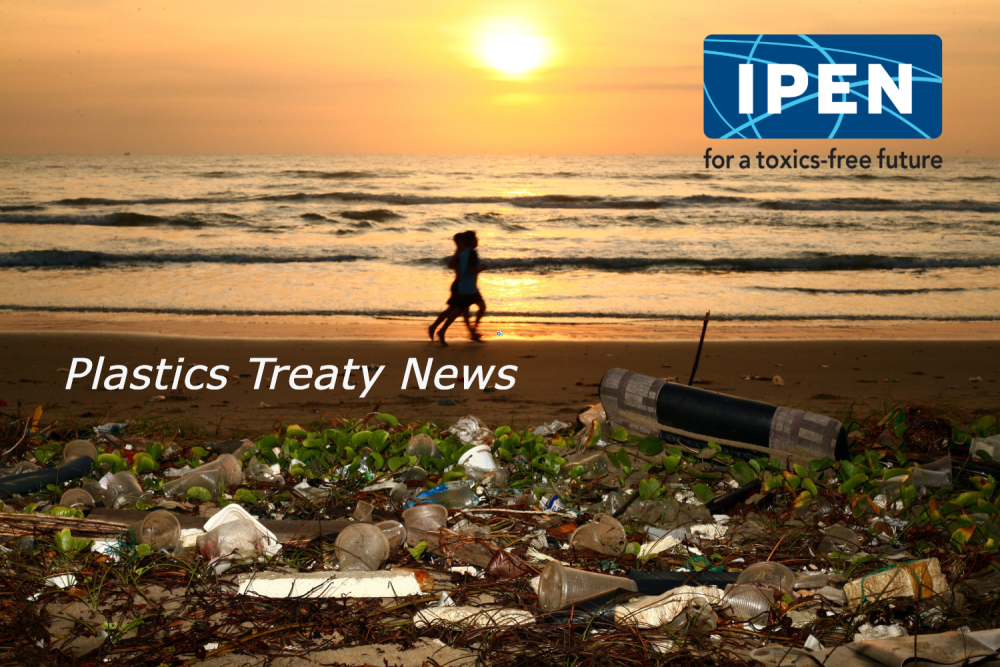Plastics Treaty News
Edition 1 - November 2022
IPEN will participate in the Plastics Treaty First Intergovernmental Negotiating Committee (INC-1) in Uruguay beginning in November 2022.
See all of our resources for the INC-1.
Foundations of a Plastics Treaty
Since IPEN’s founding at the first session of the Intergovernmental Negotiating Committee for the Stockholm Convention, we have continued to work on international policies related to chemicals, including in plastics.
We believe that an understanding of three principles will be foundational for a Plastics Treaty that addresses the human health and climate threats from plastics throughout their lifecycle, and for promoting alternatives that truly meet the needs of a non-toxic circular economy.
- Principle 1: Understanding plastics as carbon and chemicals
- Principle 2: Addressing the harmful health effects from chemicals in plastics
- Principle 3: Recognizing that toxic chemicals make plastics incompatible with a circular economy
Learn more in IPEN’s analysis of the Plastics Treaty resolution.
We all need healthy environments where we live, work, and play to fully develop and contribute to our communities. But plastics’ chemical ingredients have been linked to serious health problems and when plastics pollute our bodies and our communities, we lose the opportunity to live healthy, productive lives.
The Plastics Treaty process is a critical opportunity to strengthen international laws that protect human health and the environment from the harms of hazardous chemicals and of plastics and ensure that global controls are developed to address the toxic impacts of plastics throughout their lifecycle. See more of IPEN’s work towards a meaningful Plastics Treaty.
Voices from the Global Network: Semia Gharbi
Semia Gharbi is an educator and an environmental science and management expert and Chairperson of Tunisia’s Association De L’education Environnementale Pour Les Futures Générations (AEEFG). The AEEFG works to promote resilient education and envisions a world where everyone lives in healthy environments without toxic chemicals. Semia notes that science was always her favorite interest and she was drawn to environment science and education as it enabled her to pursue work across various disciplines.
AEEFG works within the framework of the communal, national, regional and international context, advocating for standards that guarantee fair conditions in order to limit and compensate for the inequalities that are in most cases the source of the social problems suffered by most developing countries.
In its plastic work, AEEFG’s work has developed real field data on threats from plastic products and wastes, through field surveys, sampling, analysis, and interpretation of data. Their work contributed to the IPEN report on toxic plastic pellets on beaches, and their sampling of toys, kitchen utensils and other plastic products sold in Tunisian markets demonstrated that the products were made from recycled plastic e-waste containing toxic flame retardants.
AEEFG has distributed the reports of the two plastic projects to national authorities to highlight their health concerns and push for health-protective policies, with positive responses and requests from other government agencies for data sharing. They have also approached the plastics industry who are also open to a discussion of the data and issues. Semia notes that the Arabic region, like all developing countries, suffers from waste dumping and the illegal plastic waste trade. She says, “Our countries are unfortunately considered as dumping grounds but this situation cannot continue because human rights should be equal to protect human lives and the environment.”
Chemical Spotlight: Endocrine Disruptors
Many plastic additives are known to interfere with our bodies’ natural hormones. These substances are called endocrine disrupting chemicals (EDCs). The health impacts of these widely used chemicals can be profound and life threatening.
Exposure to EDCs has been linked to cancers, diabetes, impacts on the kidneys, liver, and thyroid, metabolic disorders, neurological impacts, inflammation, infertility, and more. Alarmingly, studies show that harmful effects from EDCs may pass down from generation to generation, with health impacts affecting our children and grandchildren.
The Endocrine Society has led the scientific community in describing the effects of synthetic chemicals on our hormones. As Dr. Leo Trassande of the Endocrine Society noted in May 2022,
Plastics are a crucial source of endocrine disrupting chemicals, known as EDCs…The evidence of the human health impacts of many chemicals in common plastics is clear and extensive. These chemicals contribute to noncommunicable diseases including obesity, diabetes, heart attacks, stroke and certain cancers….[Therefore], a plastics treaty is a global health treaty.
Dr. Trassande explained further in his article in the medical journal The Lancet, “A global plastics treaty to protect endocrine health.”
The IPEN publication “Plastics, EDCs and Health,” produced in 2020 by the Endocrine Society and authored by a leading international group of scientists and professors, is an authoritative and comprehensive resource. The report details the EDCs in plastics and the hazards that these chemicals pose to human health throughout the lifecycle of plastics. You can also learn more in the IPEN/Endocrine Society’s Introduction to Endocrine Disrupting Chemicals.
Learn more about health threats from chemicals used in plastics and see all of our resources for the Plastics Treaty First Intergovernmental Negotiating Committee (INC1).

